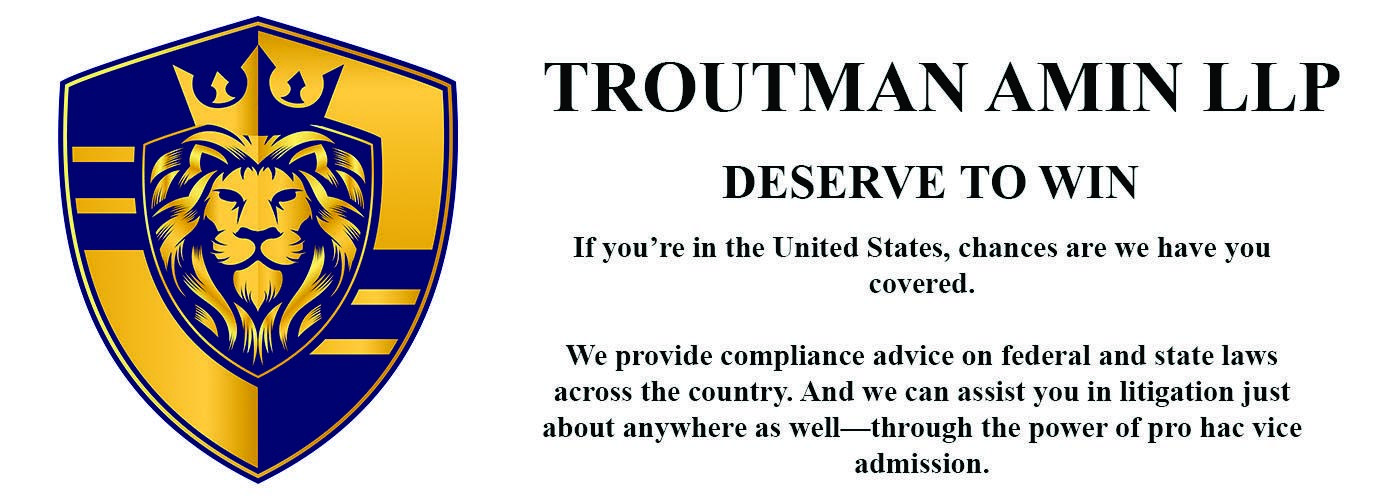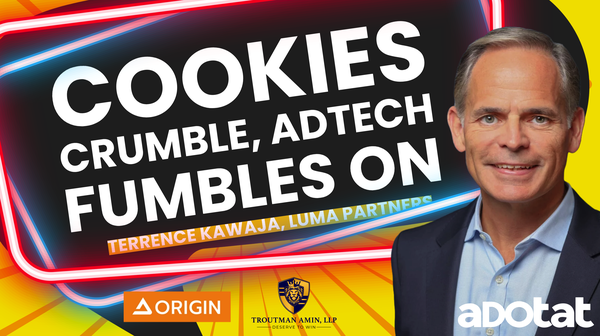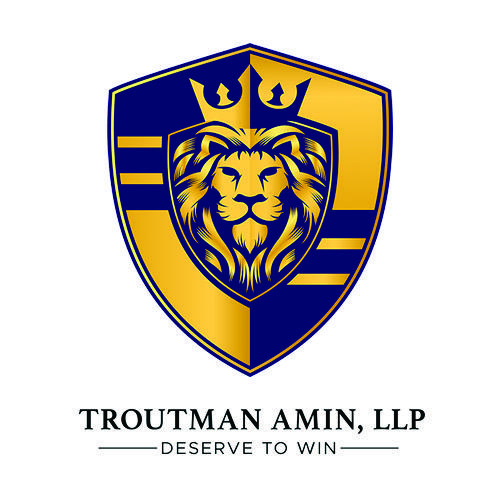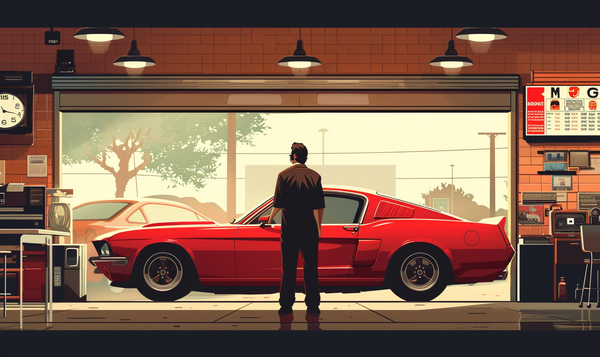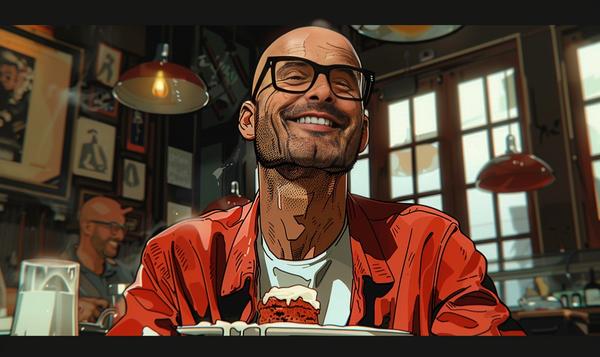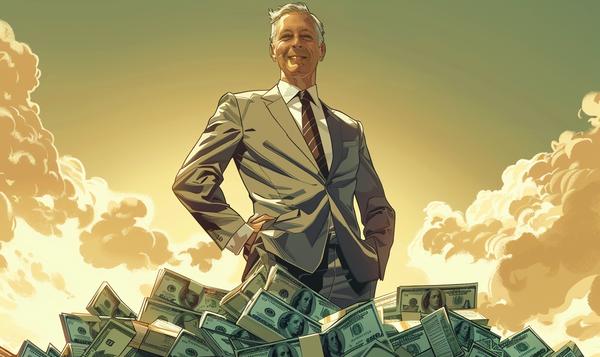🎬 Ready to turn your TV ads into showstoppers? Origin's zero-code CTV solutions are here to rescue your marketing campaigns from the abyss of mediocrity. With our award-winning creative tech, you'll captivate audiences both in the living room and on-the-go. We blend cutting-edge ad formats with direct media partnerships to ensure your brand doesn't just get seen – it gets remembered. Think agile
storytelling, dynamic creatives, and unparalleled attention metrics. Join the ranks of savvy marketers who trust Origin to elevate their advertising game. Dive into the future of CTV with Origin – where attention isn't just grabbed, it's held hostage. :LEARN MORE
The Unfiltered Genius of Terence Kawaja: How Adtech’s Peter Pan Refuses to Grow Up
If you’ve been anywhere near the ad tech world in the last decade, you’ve probably tripped over a LumaScape—or at least heard someone throw around the term like it’s a religious text. That sacred scroll of chaos, mapping out the sprawling, byzantine world of digital advertising, is the brainchild of Terence Kawaja, or Terry, if you’re on first-name terms with him. But while most of us are still trying to figure out if
that mess of logos is a blessing or a curse, Terry’s moved on to bigger and bolder things. After all, he’s the guy who’s been navigating the labyrinth of cookies, AI, and billion-dollar M&A deals with a wit as sharp as a scalpel and the guts to say what everyone else is only thinking. Let’s get one thing straight: Terry isn’t just another suit in a sea of ad tech wannabes. He’s the guy who’s been pulling the strings behind
the scenes for years, orchestrating over $300 billion in transactions with the kind of ease most of us reserve for online shopping sprees. But despite his towering influence, Terry remains refreshingly down-to-earth—cracking jokes about power washing his patio and binge-listening to 70s workout playlists while casually discussing the intricacies of antitrust cases and the impending death of cookies. Terry’s journey into ad tech
royalty wasn’t a straight shot. He started out in investment banking, where he cut his teeth on some of the biggest deals of the early 2000s, including the colossal AOL-Time Warner merger. It was the largest deal in the world at the time, a $183 billion behemoth that made headlines for all the wrong reasons. But for Terry, it was more than just a notch on his belt—it was a turning point. "I negotiated the largest M&A fee in history at the time, $60 million," Terry recalls. But instead of
riding that wave to Wall Street immortality, he did something that left his colleagues scratching their heads: he quit. "Three months after announcing AOL-Time Warner, I announced my resignation from the firm," he says. "Everyone said, are you smoking crack? Like, dude, you’re set up for life now. But I was bored." Boredom is a dangerous thing for a guy like Terry. It’s what drives him to take risks, like jumping into the
chaotic world of startups at the turn of the millennium. "I joined a company as a CFO, took it public, and that was great for a while," he says. But then the dot-com bubble burst, and Terry’s new venture came crashing down with it. "I had to become a public company CFO. I had to write all the analyst presentations. Then I had to restructure the business. I had to fire one of the co-founders, who later turns out was sexually abusing four different women at the company." It was a brutal learning
experience, but one that Terry doesn’t regret. "What I’ve decided doesn’t work for me is passing on an opportunity and watching someone else less qualified make a quarter of a billion dollars. That is razor blade and sleeping pill time." Terry Kawaja's ability to see the big picture in the tumultuous ad tech landscape is what makes him a formidable force. He’s not just navigating the game; he’s often the one drawing the map. Back in 2009, he didn’t just create the LumaScape as a marketing gimmick—it was a lifeline for an industry drowning in its own
complexity. “The LumaScape in its current manifestation was 2009,” Terry recalled, noting that he had been charting companies since 2005. But the turning point came in 2011 when the Wall Street Journal came knocking. “I had this light bulb idea: Landscape, LumaScape, I’ll put my brand in it. It’s going to be awfully hard for others to copy if my company’s name is actually the name of the product,” Terry explained. That single decision not only cemented the LumaScape's role in the industry but
also made it inseparable from his brand. The LumaScape wasn’t just about slapping a name on a chaotic industry—it was about bringing order to the chaos. But for Terry, this was just the beginning. Over the years, he’s watched ad tech balloon into a beast of its own, not always in ways he might have hoped. “This industry is like Peter Pan,” Terry remarked, pointing out its refusal to grow up. The frustration in his voice is clear as he talks about the endless
fragmentation and the numerous middlemen who siphon off profits without contributing real value. “When an SSP has a 20% margin, and DSP has a 20% margin, and a verification company has a 20% margin... it’s no wonder the ad tech tax exists,” he said, cutting right to the heart of the issue. Terry’s critiques are sharp, and they don’t stop at surface-level observations. He’s acutely aware of the industry’s reluctance to face reality. The complex ecosystem, with its
layers upon layers of players each taking their cut, has led to the much-discussed ad tech tax—a burden that falls squarely on the shoulders of brands and publishers. The numbers don’t lie, and Terry knows that unless the industry grows up and starts addressing these inefficiencies, the cost of doing business in ad tech will only keep rising. Despite the challenges, Terry remains an influential figure, one who is not afraid to speak truth to power. His vision has
always been ahead of the curve, and he’s not one to back down from challenging the status quo. The LumaScape, for all its notoriety, was never just about mapping the industry; it was about forcing it to confront its own complexities and inefficiencies. Terry’s light bulb moment back in 2011 was just one example of his ability to see beyond the immediate and to shape the narrative in a way that compels the industry to take a hard look at itself. And then there’s Google, the 800-pound gorilla in the room that Terry has been keeping a close eye on for years. Google’s cookie deprecation saga is a perfect example of the company’s power—and its ability to keep the industry on edge. "Lucy keeps pulling the football away from Charlie Brown," Terry quips, comparing Google’s endless delays to a classic Peanuts gag. "But let’s be honest, cookies are largely going away. So all of those
efforts towards data collaboration, whether it’s clean rooms or alternative identities or contextual targeting solutions, that is not wasted." But while Terry might seem like he’s got it all figured out, he’s not above poking fun at himself—or the industry. When asked about his wildest, craziest prediction for the future of ad tech, he doesn’t miss a beat: "Google will be found guilty of antitrust in the ad tech case commencing in September." And if that sounds
like a joke, it’s not. Terry is dead serious about the challenges the industry faces, from antitrust issues to the impending death of cookies to the rise of AI and its potential to revolutionize targeting. "At the end of the day, interest is better than demographics," he says. "I think technology will help lead the way." Terry’s take on the state of the industry might seem bleak, but it’s not without hope. He believes in the power of consolidation, in the idea that
fewer players doing higher volumes at lower take rates with better quality is the way forward. "I think if you think of the fact that there are over 5,000 companies in ad tech, 95% of them will go out of business," he says, matter-of-factly. "It just takes a long time because they’re getting a piece of ad spend." But if you think Terry is all business, think again. The guy knows how to unwind, and he’s got some surprising
guilty pleasures. "Power washing while listening either to a podcast or a 70s workout playlist is so satisfying," he admits with a grin. "I also love creating comedy. Creating is my happy place. I love thinking about a problem and how do I ideate it? How am I going to give a message about this using that in a way that’s humorous?" That sense of humor is a big part of what makes Terry so effective—and so beloved in the industry. He’s the kind of guy who can drop
lines like, "Exit large or die trying," and make it sound both profound and hilarious. He’s unfiltered, unapologetic, and absolutely fearless when it comes to speaking his mind. "When I’m wrong and I know I’m wrong, I’m quick to apologize," he says, his Canadian politeness shining through. "But I don’t believe in packing the audience so they’ll laugh for you. The fuck is that? I get no signal out of that." Terry Kawaja isn’t just your run-of-the-mill wisecracker;
he’s the kind of guy who’ll drop a joke that makes you spit out your coffee, and then, before you’ve even wiped your chin, he’s already five steps ahead, plotting the next billion-dollar deal. When he says, "I like comedians that make people laugh, but also manage to do something else. There’s some other message, usually substantive," he’s not just talking about stand-up routines—he’s laying down the blueprint for how he lives and breathes business. For Terry, a joke without substance is like a
donut without the filling—what’s the point? He’s always looking to mix the sweet with the serious, making sure every laugh is laced with a deeper message that sticks with you long after the punchline. In the high-stakes, cutthroat world of ad tech, where most folks are just trying to stay afloat, Terry’s the guy who’s not just swimming—he’s doing laps around everyone else while reading the fine print. He’s got this knack for seeing beyond the noise, cutting through
the BS, and finding that hidden gem of truth that everyone else missed. It’s like he’s playing 4D chess while everyone else is still figuring out the rules to checkers. Whether he’s ripping apart the latest industry buzzword or putting together a strategy that makes you wonder if he’s got a crystal ball stashed somewhere, Terry’s always digging deeper, searching for that extra layer of meaning that turns the ordinary into something extraordinary. And this isn’t
just some artsy-fartsy philosophy; it’s the secret sauce that’s made Terry a force to be reckoned with. While others are content with surface-level success, Terry’s the guy who’s drilling down, going for the gold buried beneath. He knows that in a world full of smoke and mirrors, it’s the substance that counts—the real meat beneath the sizzle. And that’s why he’s not just another talking head in a suit; he’s the guy who’ll make you laugh, make you think, and, just when you least expect it, make
you realize he’s already won the game. So, what’s next for Terence Kawaja? More charts? More billion-dollar deals? More power washing? Probably all of the above. But one thing’s for sure: he’s not done yet. Whether he’s cracking jokes or making bold predictions, Terry is a guy who’s always thinking, always pushing the boundaries, and always ready for whatever comes next. In the end, Terry’s story
is one of grit, intelligence, and an unshakeable belief in the power of honesty—both with himself and with the world around him. He might be ad tech’s Peter Pan, but he’s also its guiding star, leading the way through the chaos with a smile, a joke, and a mind that’s always two steps ahead.
WATCH THE FULL INTERVIEW ON THE ADOTAT SHOW
|
THREE STORIES THAT YOU NEED TO KNOW in a format that isn't TL:DR summarized for the busy executive
Kamala Harris's campaign
is playing a clever, albeit controversial, game by tweaking Google search ad headlines to make it look like top news outlets are in her corner. It's a sneaky marketing move that skirts Google's rules, but it’s got news organizations like The Guardian and CNN raising eyebrows. They’re not thrilled about their names being co-opted for campaign spin, even if it’s technically above board. Google defends the ads, saying they’re clearly labeled as sponsored, but critics argue it’s a fine line
between savvy campaigning and misleading voters. Meanwhile, Harris’s team insists it’s all about giving voters more context—albeit context with a heavy dose of campaign messaging. Twitch, feeling the heat from its competitors, is pulling an Instagram move to stay in the game. After bleeding market
share, the Amazon-owned platform is rolling out video stories, letting streamers share one-minute clips with all the @mentions, emote stickers, and pinch-to-resize tricks that make Instagram so addictive. The idea? Keep users hooked and ad revenue flowing by turning Twitch into a one-stop shop for gaming highlights and social updates. In short, Twitch is betting that copying Instagram’s homework might just save its class ranking. Lowe’s is hammering down on its advertising strategy by giving its Lowe’s Media Network a fresh coat of branding and
a toolbelt full of new ad placements. The home improvement giant isn't just sprucing up the name and logo; it's expanding its ad arsenal to include in-store audio, email, and even direct mail, offering advertisers more ways to nail their target audiences. With this rebrand, Lowe’s is making a clear statement: it’s ready to be a heavy hitter in the retail media space, helping brands reach the 120 million customers wandering its aisles, both virtual and
physical.
You're looking for an edge in your online marketing. ADOTAT.com is the answer. Our library of resources has been compiled by some of the world's top internet marketing experts, and it's constantly updated with new information, case studies, and
strategies.
We want to help you succeed online - that's why we offer this information for free. It's our way of giving back to the community and helping people achieve their business goals.
Sign up now and gain access to our entire library of
resources!
Want to advertise? Contact pesach@adotat.com |
|
|
The most POWERFUL name in
CIPA AI class action defense and counseling |
Meet Erin Hawryluk, the VP of Marketing at Cadent. This dynamo doesn’t just navigate the chaotic world of ad tech; she bulldozes through it like a wrecking ball through a Jenga tower. Balancing career and kids with the finesse of a tightrope walker
and the fire of a dragon, Erin is a force of nature. Picture a juggler at a three-ring circus, but instead of balls, she's handling spreadsheets, data, and an endless stream of strategic meetings. She’s been through it all, from ad sales to product marketing, and has enough stories to fill a best-selling thriller—or at least a very entertaining graphic novel. READ THE FULL INTERVIEW
SPONSORED CONTENT BY ORIGIN
Feeling stuck in the car sales slow lane? It's time to shift gears and rev up your dealership’s marketing game! Discover how Connected TV (CTV)
advertising is transforming the car-buying landscape. With unpredictable inventory, inflation, and post-COVID consumer habits, selling cars is like hitting a moving target. But don’t fret! CTV offers precision targeting, hyper-local reach, and seamless cross-device campaigns. Dive into the latest trends and learn how to turn these challenges into opportunities. Your dealership’s digital evolution starts here – read on and get ahead of the curve!
READ THE ARTICLE AT ORIGIN.
Simon Halstead: AdTech’s Cake-loving Oracle
In our ever stranger industry, there’s one name that stands out like a neon sign in a dystopian cityscape: Simon Halstead. This isn’t just any strategist; he’s the guru who can decode the industry’s most cryptic secrets while
sipping a latte, all while dropping truth bombs with the precision of a master marksman. Simon Halstead is the kind of guy who, when he speaks, the room listens—and for good reason. READ THE FULL INTERVIEW
Jon Bond: The Legend Who Ditched Cookies for a Weightless World. Jon Bond isn’t just a name in advertising; it’s a blazing marquee in the hall of fame of marketing mavens. This dynamo, who forged his reputation at the helm of Kirshbaum, Bond and Partners,
is now piloting the good ship Weightless through the turbulent seas of advertising, where antiquated tactics are about as useful as a pager in the age of smartphones. With the glint of a seasoned iconoclast, Jon dishes on his latest caper, "We're steering a cookie-less AI media firm," tossing a playful jab at the industry’s old guard clinging to data-tracking cookies like a lifeline. "Picture this," he quips, "you’re entering a space race, but your competition is saddled with horse and buggies
while you’ve already launched the rocket." READ THE FULL ARTICLE
Ever heard of someone transforming from a tech-averse marketer to an AI trailblazer? Meet Naama Manova Twito, the co-founder of the world’s first fully autonomous AR marketing team. Fasten your seatbelts, folks; this isn’t your typical startup saga. We’re talking about a journey filled with kicking, screaming, and eventually hugging the tech beast. READ THE FULL STORY NOW!
Google’s latest move is a doozy. After years of waffling on third-party cookies, the tech behemoth has decided to keep the cookies. On Monday, Google announced it would no longer axe support for third-party cookies in Chrome. Instead, they’re pushing other options that supposedly give users more control over their privacy and tracking—like handing a fox the keys to the henhouse.
Hold onto your hats, folks, because the AI hype train is barreling toward what looks like a brick wall. Investors are sweating bullets, wondering if they've thrown billions into the next big thing or the next big flop. The whispers in Silicon Valley are getting louder: Is this the second coming of the dot-com crash?
Juggling Data and Dodging Drama: Jon Watts’ Media Measurement Marathon
If you’ve ever wondered who’s steering the ship in the choppy waters of media measurement, meet Jon Watts, the Brit at the helm of the Coalition for Innovative Media
Measurement (CIMM). Jon isn’t just navigating the seas; he’s charting new courses through uncharted territories, all while keeping his cool like a British secret agent in a room full of laser beams. Recently, he took a break from his data-driven escapades to chat about the industry’s current chaos, the future of TV measurement, and why multi-currency transitions are giving him sleepless nights. READ MORE NOW
|
|

